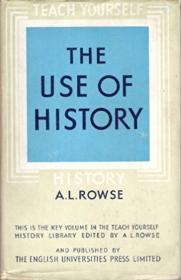It seems that everyone has had a pop at this question at some point, so I’ll throw my tuppence worth in as well. There was a time when historians were unabashed about answering it. In the nineteenth century, history was simply the ‘queen of the arts’, displacing metaphysical subjects like philosophy and theology for funding and prestige. Know the way that history operates to know the way that humanity operates: rule the world. Until at least as late as 1946, historians (like A. L. Rowse, for instance) would tell the next generation that for a successful career in government (especially running an empire), the law, or managing a big business, there was no better training than history. Others (like G. R. Elton) felt so confident in the inherent value of history that there no point justifying it beyond the fact that it should be studied ‘for its own sake’. History has, at various points, been both liberating and oppressive – useful for freedom-fighters and tyrants in equal measure. Recently, organisations like History and Policy have connected historians with journalists and policy-makers for the mutual benefit that can arise from that (context and perspective for the former; impact case studies for the latter).

Teach Yourself…The Use of History.
But while we all know that history is worthwhile and useful, it is actually quite difficult to formulate suitable explanations without compromising the discipline itself. We are conscious of judging past events by present standards, being selective in our reading of the past because of what we hope to gain in rewards and kudos, or seeking to extract universal principles from particular events and processes. ‘We can learn lessons from the past’ – certainly, but lessons that can be directly applied to the present? Let us not fall back on generalities, either. Yes, of course history requires critical thinking, careful reading of the evidence, and the development of coherent arguments. So does every other Arts subject. Historians are good writers and speakers, but they are hardly alone in this. This, then, is my attempt to highlight a few features which I think are particularly true (if not exclusive) to history: disciplinary-specific things that historians do especially well and which are valued in the world today.
- History requires nuance and awareness that the world is not ‘black and white’. All too often today, especially in present political discourse, stark boundaries are drawn between ‘us’ and ‘them’. You are either for us or against us. My side is right/good and your side is wrong/evil. There are such things as right and wrong, good and evil, but history forces us to acknowledge that most human beings occupy one of the intermediary shades-of-grey. Historical actors often thought that they were doing the right thing, even when they patently were not. Arguably, the world needs a few more people willing to operate within the grey zone, and to recognise that human beings rarely represent either pure virtue or pure malevolence.

Cromwell: Good or Evil? Historians cannot answer this – but he was a good public speaker.
- History requires empathy. As R. G. Collingwood once argued, behind every action is a thought process and, if we want to understand the action, we must first understand the thinking that underpinned it. Empathy is difficult and rarely comes naturally. It is, however, crucially important that we empathise with our fellow human beings – to place ourselves in their shoes, so to speak, even when we disagree with them most vehemently. We must try to imagine how they think, just as the historian must try to imagine how past people thought, for if we simply retreat to our comfortable entrenched positions, then the world will soon become a lonely and hopeless place.
- History requires a special kind of narrative. Narratives are the basic building blocks of the human experience. Being able to place ourselves on the continuum between past, present and future is essential to our very existence. It is what gives us purpose and meaning. Formulating an argument as a narrative is especially persuasive: the best speechmakers always attempt to do this. It is why Oliver Cromwell usually started by reminding his audiences why the Long Parliament went to war with the King and it is why Prime Ministers start their conference speeches by trashing the record of their predecessor. But persuasive narratives need to hold true. They need to be recognisable and to correlate with the facts, else they are discarded with the chip paper. Historians know how to create such narratives: it is our bread and butter.
- History straddles the boundary between art and science. It requires simultaneous engagement with real experience, on the one hand, and authorial creation on the other. Historians must deal with both the physical and the metaphysical: with knowledge and with the nature of knowledge, with actions and with meaning. Historians must generate both facts and interpretations, and they must be clear about which is which. For a general public which sometimes experiences difficulty separating one from the other, a reliable historian is also a reliable leader of public opinion.
Every branch of learning has its own virtues, so let us always seek to avoid arrogance. Nuance, empathy, persuasion, leadership: the study of history is not alone in cultivating these characteristics, though it does it in a particular kind of way and it does it well. But let us also be bullish about our own discipline and evangelical about its usefulness, without resorting to platitudes or compromising its values. The world needs historians.

The curious thing about history is that ” Truth is stranger than fiction ” and that “the devil is in the detail “
LikeLike